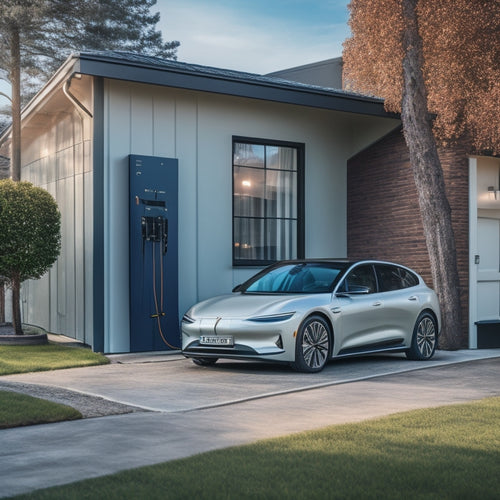
What Are the Average Costs of Solar Panel Installation
Share
You can expect to pay between $15,000 to $20,000 for a typical solar panel installation, including equipment, labor, and permitting, with regional pricing variations and financing options available to minimize upfront costs. The cost of solar panels per watt, system size, and type of equipment will also impact your total expenditure. Additionally, you'll need to evaluate other expenses like permitting fees, financing options, and maintenance costs. As you traverse the process, understanding these factors will help you make an informed decision - and there's more to uncover about how to maximize your solar investment.
Key Takeaways
- Average cost for solar panel installation ranges from $15,000 to $20,000, including equipment, labor, and permitting.
- Installation costs vary by system size, with smaller systems (2-10 kW) costing $2.50 to $3.50 per watt and larger systems (over 20 kW) costing $60,000 to $200,000+.
- Residential solar installation costs range from $15,000 to $65,000, depending on system size, equipment quality, and installation company.
- Commercial systems cost between $2.50 to $3.50 per watt, with higher upfront costs due to larger, more complex installations.
- Financing options, such as specialized solar loans and home equity loans, can minimize upfront costs and make solar installations more accessible.
National Average Solar Installation Costs
On average, homeowners in the United States can expect to pay around $15,000 to $20,000 for a standard solar panel installation. This cost includes the equipment, labor, and permitting required for a typical residential solar panel system.
You'll notice that installation trends vary by region, with some areas offering more competitive pricing than others.
When considering solar panel installation, you'll want to investigate financing options to find the one that best suits your needs. You may opt for a cash purchase, which can provide the most long-term savings.
Alternatively, you can examine loan options or leasing agreements, which can minimize upfront costs. Many homeowners choose to finance their solar panel installation through specialized solar loans or home equity loans.
These financing options can help you spread the cost over several years, making solar energy more accessible.
Factors Affecting Solar Panel Prices
Beyond the national average, several factors influence the final cost of solar panel installation, and understanding these variables is essential to accurately estimating the expense of going solar.
You'll need to take into account the size of your solar panel system, which directly affects the overall cost. Larger systems require more equipment and labor, increasing the expense. The type and quality of solar panels you choose also play a crucial role in the final cost. High-efficiency panels may be more expensive upfront, but they can provide greater energy output over time.
Additionally, solar technology advancements can impact pricing. As technology improves, costs tend to decrease. You may also encounter regional price variations depending on your location. Installation costs can vary greatly depending on the state or region you're in, due to factors like local labor costs, permitting fees, and incentives.
Other factors, such as roof size, orientation, and complexity, can also influence the final cost of your solar panel installation. By understanding these factors, you can make informed decisions and get a more accurate estimate of your solar panel installation costs.
Cost of Solar Panels per Watt
You'll find that the cost of solar panels per watt varies depending on the system size you're installing.
Generally, larger systems tend to have a lower cost per watt, while smaller systems are more expensive per watt.
This price variance is largely due to the economies of scale that come with larger installations, which you'll want to take into account when planning your solar panel setup.
System Size Matters
Typically, homeowners and businesses evaluating solar panel installation focus on the total cost of the system, but it's equally important to understand the cost of solar panels per watt. This metric gives you a better sense of the system's efficiency and value.
You'll want to take into account the size of the system you need to achieve energy independence, which depends on your energy usage and local regulations. A larger system doesn't always mean better, as it may not be necessary to meet your energy needs.
You should also think about the environmental impact of your system and how it fits into your financing options. Installation timelines and grid connection requirements will also influence your system size decision.
Advances in technology have improved system efficiency, making it possible to generate more power with fewer panels. Additionally, battery storage options can enhance your system's performance and provide backup power during outages.
When evaluating system sizes, consider performance monitoring and maintenance requirements to guarantee peak energy production. By understanding the cost per watt, you'll be better equipped to make an informed decision about your solar panel installation.
Price Variance Explained
The cost of solar panels per watt varies greatly depending on several factors, including the type and quality of equipment, installation company, and location. You may find that the cost per watt for a high-efficiency panel from a top-tier manufacturer is markedly higher than a lower-efficiency panel from a lesser-known brand.
In addition, the installation company you choose can impact the cost, as more experienced installers may charge higher rates.
Regional pricing also plays a crucial role in the cost of solar panels per watt. Installation costs can vary by as much as 50% depending on the state or region you're in. For example, installations in California may be more expensive than those in other states due to higher labor costs and stricter regulations.
Moreover, installation variability can also affect the cost per watt. Factors such as roof size, complexity, and local building codes can increase or decrease the overall cost of the installation.
Understanding these factors will help you make an informed decision when selecting a solar panel system that meets your energy needs and budget. By considering the type and quality of equipment, installation company, and regional pricing, you can get the best value for your money.
Installation Costs by System Size
You're likely wondering how the cost of solar panel installation varies by system size.
As you investigate options, you'll encounter small systems (2-5 kilowatts), medium systems (5-10 kilowatts), and large systems (10-20 kilowatts or more), each with its own installation cost profile.
Understanding these differences will help you make an informed decision about your solar panel investment.
Small System Costs
Hooking up a small solar panel system can be a great way to dip your toes into renewable energy, and understanding the installation costs by system size is essential for making an informed decision.
Small systems, typically ranging from 2-10 kilowatts (kW), are ideal for smaller homes, apartments, or cabins. The benefits of small systems include lower upfront costs, easier installation, and reduced maintenance needs.
On average, the installation cost for a small solar panel system ranges from $2.50 to $3.50 per watt. For a 5 kW system, this translates to a total cost of around $12,500 to $17,500.
While this may seem like a significant investment, small system financing options are available to help make solar energy more accessible. Many solar panel installers offer financing plans or partnerships with lenders that can help spread the cost over time.
Additionally, you may be eligible for federal and state tax credits, which can help offset the initial investment. By understanding the costs and benefits of small solar panel systems, you can make an informed decision about whether renewable energy is right for you.
Medium System Prices
Your medium-sized solar panel system, typically ranging from 10-20 kilowatts (kW), is ideal for larger homes, small businesses, or farms. This size system can provide a significant amount of power and is a popular choice for those who want to reduce their energy bills and carbon footprint.
| System Size (kW) | Average Installation Cost |
|---|---|
| 10 kW | $25,000 - $30,000 |
| 12 kW | $28,000 - $33,000 |
| 15 kW | $32,000 - $38,000 |
| 20 kW | $40,000 - $50,000 |
When it comes to medium system efficiency, you can expect an average efficiency rate of around 18-20%. This means that for every unit of sunlight that hits your panels, you'll get 18-20 units of electricity. Additionally, medium system lifespan is typically around 25-30 years, with some systems lasting even longer with proper maintenance.
Keep in mind that the installation costs mentioned above are just averages, and your actual costs may vary depending on several factors, such as the quality of the equipment, the complexity of the installation, and the installation company you choose.
Large System Expenses
Larger homes, commercial buildings, and industrial facilities often require even more power to cover their energy needs. You'll need a large-scale solar panel system to meet these demands. Installation costs for systems over 20 kilowatts (kW) can range from $60,000 to $200,000 or more, depending on the size and complexity of the project.
While the upfront cost may seem intimidating, installation financing options are available to help make large-scale solar more accessible.
The benefits of large-scale solar installations far outweigh the costs. You'll enjoy considerably reduced energy bills, increased property value, and a reduced carbon footprint.
Additionally, large-scale solar installations can provide a substantial return on investment through tax incentives, rebates, and net metering programs. With the cost of solar panels decreasing over the years, the large-scale benefits of solar energy are becoming more attractive than ever.
As you consider a large-scale solar installation, be sure to research and take advantage of available financing options and incentives to maximize your return on investment.
Average Cost of Residential Solar
As you contemplate shifting to renewable energy, understanding the average cost of residential solar panels is essential for making an informed decision. The cost of residential solar panels varies depending on several factors, including the system size, equipment quality, and installation company.
| System Size (kW) | Average Cost |
|---|---|
| 3-4 kW | $15,000 - $20,000 |
| 5-6 kW | $25,000 - $35,000 |
| 7-8 kW | $35,000 - $45,000 |
| 9-10 kW | $45,000 - $55,000 |
| 11-12 kW | $55,000 - $65,000 |
When planning your solar panel installation, you'll need to reflect on solar panel financing options and the installation timeline. On average, the installation process takes around 2-3 months, including permitting, installation, and inspection. With the right financing options, you can enjoy the benefits of solar energy while minimizing upfront costs.
Commercial Solar Installation Prices
Shifting to commercial solar installation, you're likely to encounter different pricing structures and system requirements compared to residential solar.
Commercial solar systems are typically larger and more complex, requiring more extensive installations and higher upfront costs. On average, the cost of commercial solar installation ranges from $2.50 to $3.50 per watt, with the total system cost varying widely depending on the size and complexity of the installation.
However, commercial solar installations often come with attractive incentives. You may be eligible for commercial incentives, such as the Modified Accelerated Cost Recovery System (MACRS), which allows you to depreciate the system over five years.
Additionally, financing options like power purchase agreements (PPAs) and solar leases can help you spread the upfront cost over time. These financing options can make commercial solar more accessible and provide a clear path to long-term energy savings.
Additional Costs to Consider
You've secured funding for your commercial solar installation and are ready to move forward, but don't forget to factor in additional costs that can impact your project's overall feasibility.
One such cost is permitting fees, which can range from $2,000 to $5,000, depending on the complexity of the installation and local regulations. Installation permits, equipment upgrades, and aesthetic considerations can also add to the overall cost.
Moreover, you'll need to take into account financing options, which may come with interest rates and fees.
Unexpected repairs and maintenance can also arise, and it's important to budget for these expenses.
Insurance costs, which can range from 1% to 3% of the total installation cost, should also be factored in.
Additionally, connecting your solar panel system to the grid can come with additional costs, including the installation of a grid connection device and potential utility fees.
Incentives and Rebate Opportunities
Take advantage of incentives and rebate opportunities to offset the costs of your commercial solar installation. As a business owner, you can enjoy significant savings and benefits from various programs and initiatives.
These incentives can help you recoup a substantial portion of your investment, making solar energy a more viable option for your organization.
Some of the benefits you can investigate include:
- Federal incentives: Claim tax credits of up to 30% of your total solar installation cost
- State rebates: Receive cashback or rebates from your state government for going solar
- Local programs: Tap into city or county-level initiatives that offer discounts or financing options
- Grant opportunities: Apply for grants from private organizations or government agencies to fund your solar project
- Installation discounts: Negotiate with your solar installer to get discounts on the total installation cost
Solar Panel Maintenance Expenses
Most commercial solar installations require minimal maintenance, but some expenses are still inevitable. You'll need to budget for occasional solar panel repairs, which can range from $100 to $500 per incident, depending on the complexity of the issue.
The maintenance frequency for your solar panels will depend on factors like weather conditions, debris accumulation, and system complexity. Cleaning costs, typically ranging from $100 to $300 per year, are vital to guarantee peak energy output.
Warranty coverage often includes maintenance and repair services, so be sure to review your contract carefully. Efficiency monitoring is fundamental to identify potential issues before they escalate, and this service may be included in your warranty or service contract.
You may also need to take into account system upgrades or installation inspections, which can cost upwards of $1,000. To minimize maintenance expenses, think about investing in a service contract, which can provide priority scheduling, discounted rates, and extended warranty coverage.
Long-Term Savings and Benefits
The return on investment (ROI) of a commercial solar panel installation is substantial, with long-term savings and benefits offsetting the initial costs.
You'll start seeing financial benefits as soon as your system is installed and begins generating electricity.
-
Your electricity bills will decrease markedly, as you'll be generating your own power from the sun.
-
You'll increase your property value, making your business more attractive to potential buyers or investors.
-
You'll benefit from federal and state tax incentives, which can help offset the initial installation costs.
-
You'll reduce your reliance on the grid and protect yourself from rising electricity rates.
-
You'll contribute to a reduced environmental impact, as solar energy is a clean and renewable source of power.
Frequently Asked Questions
Can I Install Solar Panels Myself to Save Money?
You can attempt a DIY installation to save money, but consider the risks: ensuring safety, complying with local regulations, and meeting equipment requirements can be challenging, and improper installation may void warranties or compromise system performance.
Do Solar Panels Work During Power Outages?
You'll find that solar panels don't provide power during outages unless you have a battery backup system, as grid-tied systems shut down for safety reasons, highlighting the importance of understanding solar energy efficiency and grid connection implications.
How Long Does a Solar Panel Installation Take?
Like a sunrise, your solar panel installation begins to take shape, and you're wondering, how long will it take? Typically, installation timelines span 2-5 days, depending on weather considerations, but don't worry, you'll be utilizing power in no time!
Can I Finance My Solar Panel Installation?
You can finance your solar panel installation through various solar financing options, such as loans or power purchase agreements, depending on your loan eligibility, which considers factors like credit score, income, and debt-to-income ratio.
Do Solar Panels Increase My Property Value?
You'll see a significant return on investment when you install solar panels, as they increase your property value, according to a property appraisal, which can enhance your selling price, making your home more attractive to potential buyers.
Related Posts
-

5 Essential Tips for Buying EV Charging Systems Online
When purchasing an EV charging system online, you'll want to make sure you're making an informed decision. First, det...
-

5 Ways Bike Sharing Boosts Urban Sustainability
As you explore bike-sharing options, you'll discover five ways it boosts urban sustainability. By reducing congestion...
-

Why Cities Need Smart Charging Infrastructure Now
You're about to experience a tidal wave of electric vehicles hitting your city's streets, and it's essential you're p...


